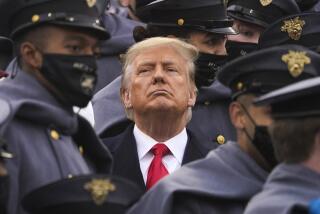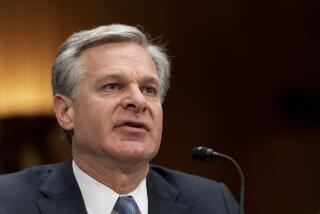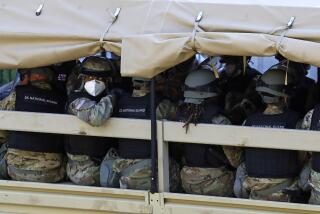Security Chief Must Battle Bureaucracy
When he takes the oath of office today as the nation’s first director of the Office of Homeland Security, one day after the U.S. launched strikes on Afghanistan, former Pennsylvania Gov. Thomas J. Ridge assumes a heavy burden: to keep the nation safe from future acts of terrorism.
But critics say he faces another task that could prove just as difficult: taming the turf-conscious bureaucracy being marshaled to the nation’s defense. Even before Ridge arrived in Washington, Congress was at odds with the White House over whether to give the new anti-terrorism czar the budget authority that security experts say he will need to get the job done.
“He’s going to be sitting around the table with some pretty powerful actors in this town--CIA, FBI, Defense, Justice and others,” said former Democratic Rep. Lee Hamilton, director of the Woodrow Wilson International Center for Scholars. “The real question is: Will he have the authority?”
White House spokesman Scott McClellan said Ridge will have “all the authority he needs” to carry out his mission because he will report directly to the president.
If geography is destiny--and in Washington it often is--Ridge will have plenty of influence, working in the West Wing near the president’s office.
But he comes into his $140,000-a-year job amid a growing debate over whether he has enough authority “in getting a 40-mule team to be pulling in the right direction,” as John Pike, a national security expert, put it.
Ridge appeared ready for the challenge. In a speech Friday, he announced plans to review the activities of the 40-plus federal agencies involved in anti-terrorism, from the CIA to the Environmental Protection Agency. And he signaled his intention to reach beyond conventional weapons of terrorism. “If you want to respond to terrorism and you want to fight back, then you create an educated citizenry,” he said.
‘Lead, Oversee and Coordinate’
Ridge’s mission, President Bush said in his speech to Congress after hijacked planes crashed into the World Trade Center, the Pentagon and a field in Ridge’s home state, is to “lead, oversee and coordinate a comprehensive national strategy to safeguard our country against terrorism, and respond to any attacks.”
He will be under pressure to get results--fast.
Lawmakers from both parties are pushing to strengthen Ridge’s hand, sponsoring legislation to give him clear budget authority over how much money each agency spends on anti-terrorism. Legislation also has been introduced to require Senate confirmation of the Homeland Security chief.
Bush set up the office by executive order, and, said White House Press Secretary Ari Fleischer, legislation is “just not necessary.”
But Rep. Jane Harman (D-Venice), the top Democrat on the House Terrorism and Home Security subcommittee, said she plans to tell Ridge that “even a guy with your skills will be climbing up a very steep hill” unless Congress gives him budget authority.
Sen. Dianne Feinstein (D-Calif.), who chairs the Senate Judiciary subcommittee on technology, terrorism and government information, agreed that Ridge needs the authority to “move the chessmen around the board. Without that budget authority, he can say something, and departments find ways not to do it.”
And Sen. Bob Graham (D-Fla.), chairman of the Senate Select Committee on Intelligence, said that giving Ridge budget authority is designed to make sure he can carry out his mission.
National security experts also say Ridge must define his agency’s role and scope.
“What is homeland defense? Everyone’s in favor of it, but how will we recognize it when we have it?” asked Pike, director of Globalsecurity.org, a national security think tank in Alexandria, Va. “Where does homeland defense leave off and law enforcement begin? His big challenge is going to be defining homeland defense broadly enough to actually accomplish something.”
Ridge is expected to have a staff of about 100, much of it detailed from other agencies. His staff reportedly will include Mark Holman, a Washington lobbyist who was once Ridge’s chief of staff.
Communities Also Will Need Guidance
Besides focusing on intelligence gathering and dealing with threat assessment, Ridge may have to deal with more mundane matters such as requests from local officials for federal dollars to buy gas masks, protective suits and anthrax vaccine.
Oklahoma Gov. Frank Keating called on Ridge, as his first order of business, to convene “the best and the brightest” minds in intelligence and come up with a realistic threat assessment so local government knows how to prepare.
Once that’s done, he wants Ridge’s office to write up a sort of manual that will list various threats and give brief recommendations on how to respond. He likened this to the manual pilots carry in the cockpit so when a warning light comes on, they flip to the appropriate page and can instantly trouble-shoot.
“We are very good as a nation at responding to tornadoes, earthquakes, mudslides and bullet wounds, but anthrax--who will know what that is, and how to respond to it?” Keating said.
Ridge declined repeated requests for an interview.
But members of Congress and national security experts offered ideas about how Ridge should go about his job.
Feinstein said that one of Ridge’s first tasks should be to assess the government’s anti-terrorism efforts.
“There is no common definition among the departments of what is terrorism and what you want to counter,” she said. “Therefore, everybody is kind of all over the map.”
Feinstein said that she doesn’t expect too much meddling by Congress.
“The tough thing [for Ridge] is really knowing what to do fast enough to make a difference,” she said.
Ridge’s success may depend on sheer bureaucratic skill, leadership and White House connections.
Tom Campbell, a former congressman and now Stanford law professor, looks to the National Security Council and FBI as precedents.
“When Henry Kissinger was national security advisor, NSC was powerful. With others, it was less so. J. Edgar Hoover made the FBI what it was--but when it was created it was every bit as nebulous as the Homeland Security office,” Campbell said. “That’s a skill of both positive and negative virtues,” he said. “Don’t force the president to make a decision between CIA and Homeland Security unless you have to . . . but make yourself indispensable.”
Experts agreed that Ridge will need Bush’s strong support to show a combination of reassurance and concrete actions.
Campbell said that the lack of coordination between intelligence agencies--addressed, in part by the anti-terrorism legislation working its way through Congress--should top Ridge’s agenda.
*
Simon reported from Washington and Piller from San Francisco. Times staff writers Aaron Zitner and Stephanie Simon contributed to this report.
More to Read
Start your day right
Sign up for Essential California for news, features and recommendations from the L.A. Times and beyond in your inbox six days a week.
You may occasionally receive promotional content from the Los Angeles Times.







